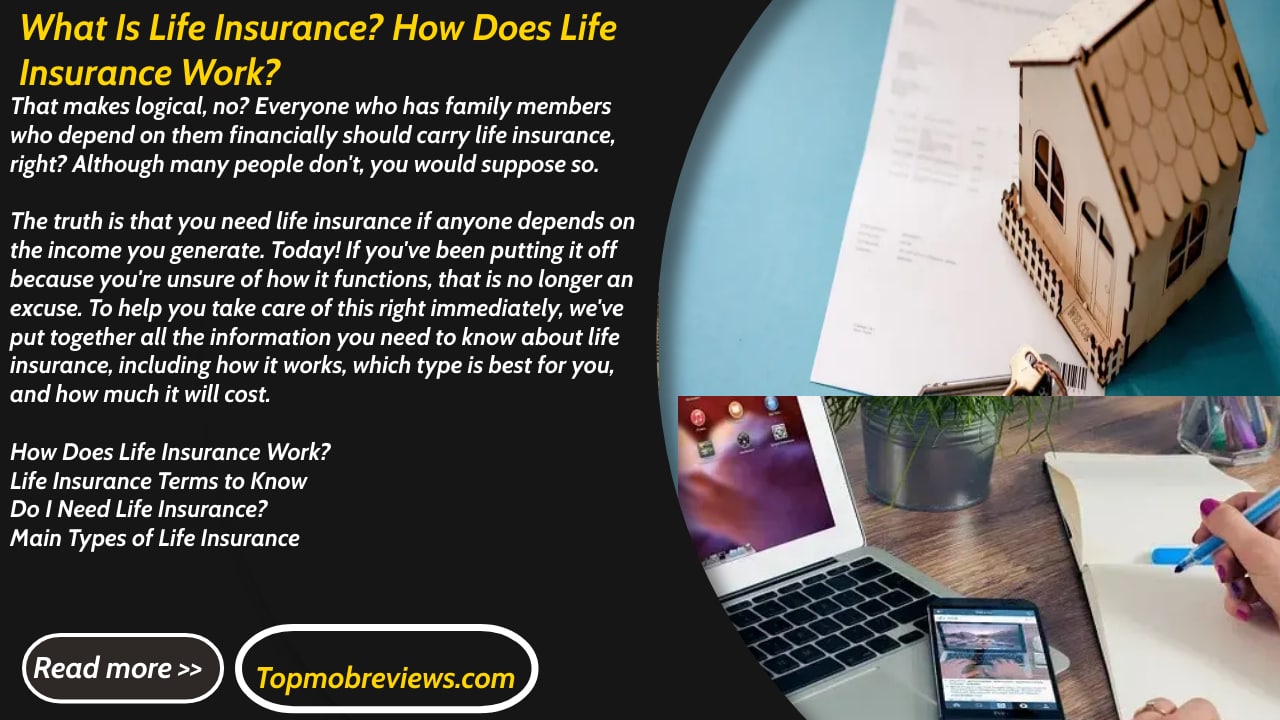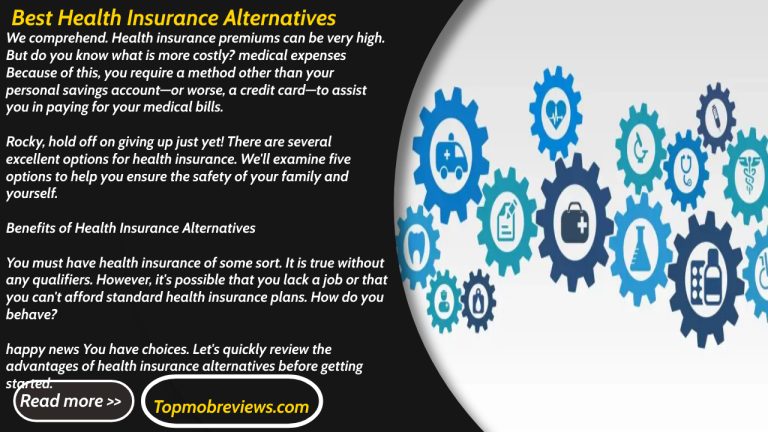What Is Life Insurance? How Does Life Insurance Work?
That makes logical, no? Everyone who has family members who depend on them financially should carry life insurance, right? Although many people don’t, you would suppose so.
The truth is that you need life insurance if anyone depends on the income you generate. Today! If you’ve been putting it off because you’re unsure of how it functions, that is no longer an excuse. To help you take care of this right immediately, we’ve put together all the information you need to know about life insurance, including how it works, which type is best for you, and how much it will cost.
- How Does Life Insurance Work?
- Life Insurance Terms to Know
- Do I Need Life Insurance?
- Main Types of Life Insurance
- How Much Life Insurance Do I Need?
- How Much Does Life Insurance Cost?
- How Do Life Insurance Payouts Work?
- How Do I Buy Life Insurance?
How Does Life Insurance Work?
Here is a high-level explanation of how life insurance functions.
Your income replacement upon death is the sole purpose of life insurance. Consider this: How would your family manage to cover living expenses without incurring significant debt in the event of your untimely death? By eliminating that risk, life insurance gives you and your family peace of mind. With this safeguard in place, you can be sure that your family will be financially secure even if the worst occurs.
Life insurance has a straightforward idea, as we stated at the outset. The application process for life insurance is a little more difficult. The reason for this is that the business has complicated matters by using a variety of language and offering more varieties of life insurance than you can shake a stick at.
However, we’ll walk you through everything and even cover the information you need to know to submit a claim for a death benefit. Let’s start by going through the key terms of life insurance.
Life Insurance Terms to Know
Have you encountered a lot of baffling terminologies while researching your options for life insurance? Breathe. To truly comprehend how life insurance functions, you simply need to be familiar with a few popular terms:
Death benefit: The amount paid out as a result of your life insurance policy
Beneficiaries: the persons you designate to receive your insurance policy’s death benefit (like your spouse or children, but it can be anyone you name)
A formal request for payment of the death benefit is known as a claim.
The insured person is the one whose death triggers the payment of the death benefit by the insurance company.
Policy: the agreement you and the insurance provider have in place
The monthly or yearly payments you must make to keep your life insurance policy in force are called premiums.
Normally, you (the insured) are the policy’s owner, but you may also purchase a policy on behalf of someone else.
Do I Need Life Insurance?
You need life insurance if, as we previously indicated, anyone in your life depends on you financially. How much you require can appear very different depending on where you are in life. So let’s discuss your life insurance requirements based on your various life stages.
Young Professionals
You need enough life insurance to cover your debts if you have credit card or student loan debt that would need to be repaid in the event of your untimely death. However, if you are fully debt-free and don’t have any children (or other dependents), all you really need to be concerned about are funeral expenses. Additionally, you’re undoubtedly insured if you’ve enrolled in a group life insurance plan through your employer. You don’t need to get your own coverage just yet!
Newlyweds
Congratulations! You’ve only recently begun your new life together, so you’re committed to supporting one another no matter what. But the conversation doesn’t end with “until death does us part.” Both of you should be covered by a life insurance policy.
This is about preserving and providing for your spouse’s future while they cope with your loss, not only about paying off debts in the event of one of you passing away. Purchase adequate life insurance to cover their needs. (We’ll discuss the specifics of how much in a moment.)
Parents
Even if one of you doesn’t have a job outside the home, you and your spouse still need to be protected if you have kids. The family finances would still suffer if a stay-at-home parent were to leave. The price of child care is high.
In the years following your death or the death of your spouse, take into account what it would cost to maintain the home, provide for your children (including college), and maybe pay off your mortgage. We assure you that the appropriate life insurance will provide you with the tranquility you desire (and need).
Main Types of Life Insurance
You may already have sizable retirement savings at this point. You might even be close to achieving self-insurance. It’s wonderful to be there!
Let’s assume, however, that you’re still striving to increase your retirement funds while paying down your mortgage. Would the money in your savings be adequate to support your spouse if you passed away today and they were no longer able to rely on your income? Keep in mind that purchasing life insurance is mostly done to replace lost income.
What is the price of term life insurance?
You accept the Zander Insurance Group and Ramsey Solutions Additional Terms by continuing. ReCAPTCHA is used to safeguard this website. The terms of service and Google Privacy Policy are in effect.
How Much Life Insurance Do I Need?
There are many different types of life insurance policies, but they all fall into one of two categories: whole life (often the worst choice) or term life (which we always recommend).
Why are term life insurance policies so beloved by us? The explanations are straightforward:
It is the most affordable kind of life insurance.
It fulfills the sole purpose of life insurance, which is to replace your income in the event of your death.
It offers protection for a predetermined period of time, long enough for you to acquire self-insurance.
Because whole life insurance does precisely what its name implies—it provides coverage for the whole of your life—it is often referred to as perpetual life insurance.
That may seem like a decent offer. But rest assured, it isn’t. Every type of whole life insurance makes an effort to combine life insurance and savings into a single policy. The problem is that it isn’t very good at either. Because you wind up paying so many costs, whole life insurance is significantly more expensive than term life insurance, and the savings component nearly never meets expectations.
The worst thing is not even that. Your family will receive the death benefit if you keep the policy until you pass away, but whatever funds you were able to accumulate will go to the insurance provider. Yes, none of it will be seen by your relatives. That is a scam if that seems familiar.
For this reason, we advise term life insurance to everyone who requires it. Let’s now discuss how much insurance to get.
How Much Does Life Insurance Cost?
Look for a level term policy that lasts 15-20 years and pays out 10–12 times your yearly earnings when you purchase term life insurance. Buy a term life insurance policy for between $1 million and $1.2 million if your annual income is $100,000.
That appears to be a lot. However, the idea is that if something were to happen to you within that 15-20 years, your family may invest the death benefit in mutual funds that invest in high-growth stocks. They can then replace your salary each year by growing that investment.
What amount of term life insurance is required?
Individual Annual Income Retirement from the Household $0.
What Is the Price of Life Insurance?
The enjoyable part is now. How much should you anticipate spending?
The cost of a life insurance policy is influenced by the kind you choose (term life or whole life), but there are additional factors to consider. When calculating your life insurance premium, insurance companies take into account all of the following:
- Age
- Gender
- Personal and family medical history
- Weight
- Tobacco use
- Risky hobbies, like skydiving or shark wrestling
- Regular travel to dangerous parts of the world
The cost of your life insurance policy is mostly influenced by your age and your health. Based on your age and term length, we’ve created a chart to give you an idea of what you may anticipate spending for a $1 million nonsmoker insurance.
Although a medical exam is typically a requirement for coverage, there are certain life insurance options available without one.
How Do Life Insurance Payouts Work?
You can be sure that if you ever need to file a claim on your life insurance, it won’t be at a convenient moment. It may be less worrisome if you are aware of some life insurance payout fundamentals. Here are some things you need to be aware of:
- How do you get in touch with the insurer? You can get in touch with the life insurance provider when you need to file a claim.
- What documents are required? A certified copy of the policyholder’s death certificate, obtained either from the hospital or the county or municipality where they passed away, must be given to the insurance company by the beneficiary.
- When ought one to assert a claim? A claim can be made for a life insurance benefit at any time. When you and your family are ready, you can handle it on your own schedule.
- When will you get the money? After the insurance company gets all the necessary documentation, life insurance benefits are typically paid out within 30 days.
- What taxes are you going to owe? Payments from life insurance are tax-free!
Where Can I Find Life Insurance?
Let’s simplify this. When purchasing a life insurance policy, you must essentially choose between three options:
- What type?
- How much?
- How long?
The first two queries can be answered by us: Always purchase 10–12 times your annual salary in term insurance. However, the choice of how to respond to the third question is ultimately up to you. This is why.
A term life insurance coverage that lasts for 15-20 years is best for the majority of people. If you have small children, this will ensure that by the time the term life insurance policy expires, they will have graduated from college and be independent.
During those 15-20 years, if you’re following our Baby Steps, you’ll be busy setting up an emergency fund and investing your money in mutual funds. Since you won’t need life insurance by the time your term life insurance plan expires.






